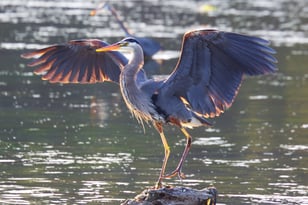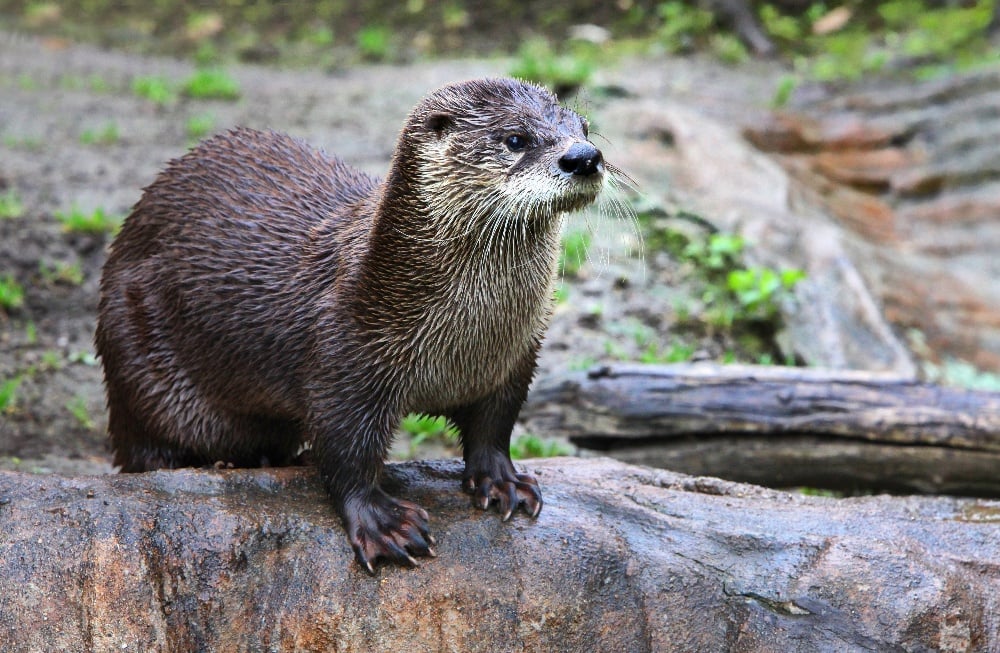Pond predators can be an unwanted sight around your pond, especially if you just spent your hard earned money to stock it. This article will go over some of the most common pond predators and how they might affect your pond and fish populations.
Our first group of predators to consider, pose a threat from above, including wading birds like herons and egrets, along with diving birds including cormorants, pelicans, and ducks. Some of these birds are seasonal guests that show up in larger groups, generally in the late fall and winter then stay till spring, while others are year-round residents that are most often territorial.
 The Great Blue Heron and Egrets are solitary hunters and are most often found standing in the shallows of your pond poised like a statue waiting to strike their next meal. These birds use their spear like beak to either stab larger fish, or grab smaller fish that they eat whole. They are a very low threat to your pond, if they are infrequent guests, however if they decide to make your pond their permanent residence or multiple birds start showing up, they can be a detriment to your fisheries. These birds can eat 1-2 pounds of fish per day per individual. The larger fish that they try to spear are left with an injury they might not recover from. If you do notice that you have an issue with these birds, do what you can to move them out of the area, as long as you don’t shoot at or near them to be in compliance with the law protecting migratory birds.
The Great Blue Heron and Egrets are solitary hunters and are most often found standing in the shallows of your pond poised like a statue waiting to strike their next meal. These birds use their spear like beak to either stab larger fish, or grab smaller fish that they eat whole. They are a very low threat to your pond, if they are infrequent guests, however if they decide to make your pond their permanent residence or multiple birds start showing up, they can be a detriment to your fisheries. These birds can eat 1-2 pounds of fish per day per individual. The larger fish that they try to spear are left with an injury they might not recover from. If you do notice that you have an issue with these birds, do what you can to move them out of the area, as long as you don’t shoot at or near them to be in compliance with the law protecting migratory birds.
Protecting Your Habitat
Once your fish have survived the barrage of threats from all of the birds trying to make a meal of them, they then have to ward off other mammals and reptiles trying to catch a quick bite. Raccoons, otters, alligators and even turtles are predators in your pond. Raccoons probably pose one of the smallest threats to your fishery as they are often looking for a quick meal and don’t want to put out a lot of effort in swimming to catch a fish. That being said they will catch and eat your fish if the opportunity presents itself. Raccoons will leave telltale signs of a visit in the form of fish carcasses with the middles missing along with tiny hand prints in the mud. The other problem that occurs with raccoons concerns their excellent ability at stealing fish food to get an easy meal. This is why our feeders come with a cage around the bottom portion to prevent raccoons and other varmints from helping themselves. Keeping your shoreline clear and the perimeter of your pond mowed and cleaned will help to prevent these thieves from showing up.
Otters and Alligators on the other hand will swim and actively search out fish to consume. These animals unlike the others listed are more concerning, because they can eat large amounts of fish including your trophy stock. Otters can consume as much as 8 pounds of fish per day, and live in small groups, so if you see one, chances are, there are several more in the area. The best way to deal with these animals is to contact your state wildlife agency and speak to someone there about removal, they will be able to inform you on the legal guidelines as well as putting you into contact with an individual or company that can remove them. Alligators will pose a similar threat, as they consume vast amounts of fish during the spring, summer and fall before going into hibernation for the winter. These animals are a major problem for your fishery and can be threatening to humans as well. Most often you will see them soaking in the sun on the bank or catch a glimpse of their eyes and head before they sink below the surface. As stated with the otters the best way to control these animals is to contact your state wildlife agency about the legal options and potentially a service to remove these animals.
Though it may not seem as concerning, beavers and turtles can also be a threat to your pond. Beavers are herbivorous, eating plants and bark, but their actions in doing so can destroy you landscape and structure around the pond. These animals will cut down or injure trees, and may cause extensive damage to your dam, by burrowing tunnels and threatening its integrity to impound water. You can buy permits to trap these animals in certain areas for removal, be sure to follow all state and regional laws as well as regulations for permits before trapping. Turtles are present in almost every pond and body of water. They may not seem like a predator but they can be a nightmare during spawning season.
Turtles will raid spawning nests eating the fish eggs and destroying the nest. They will also predate on smaller fish that they can ambush and catch. Turtles are opportunists that will not pass up an easy meal, this means fish feeders. Once they figure out that when the feeder goes off they will show up and compete with the fish you are trying to feed. They are easily controlled with the turtle traps we offer. These are live traps that collect the turtles that you can later remove and relocate.
Protect your investment and be aware of common threats to your pond, like the saying goes, “An ounce of prevention is worth a pound of cure”.




